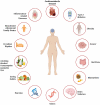Mendelian randomization studies of depression: evidence, opportunities, and challenges
- PMID: 37996851
- PMCID: PMC10666459
- DOI: 10.1186/s12991-023-00479-6
Mendelian randomization studies of depression: evidence, opportunities, and challenges
Abstract
Background: Major depressive disorder (MDD) poses a significant social and economic burden worldwide. Identifying exposures, risk factors, and biological mechanisms that are causally connected to MDD can help build a scientific basis for disease prevention and development of novel therapeutic approaches.
Methods: In this systematic review, we assessed the evidence for causal relationships between putative causal risk factors and MDD from Mendelian randomization (MR) studies, following PRISMA. We assessed methodological quality based on key elements of the MR design: use of a full instrumental variable analysis and validation of the three key MR assumptions.
Results: We included methodological details and results from 52 articles. A causal link between lifestyle, metabolic, inflammatory biomarkers, particular pathological states and MDD is supported by MR investigations, although results for each category varied substantially.
Conclusions: While this review shows how MR can offer useful information for examining prospective treatment targets and better understanding the pathophysiology of MDD, some methodological flaws in the existing literature limit reliability of results and probably underlie their heterogeneity. We highlight perspectives and recommendations for future works on MR in psychiatry.
Keywords: Causality; Depression; Instrumental variables; Mendelian randomization study; Risk factors.
© 2023. The Author(s).
Conflict of interest statement
The authors declare that they have no competing interests.
Figures



Similar articles
-
Evaluating the current state of Mendelian randomization studies: a protocol for a systematic review on methodological and clinical aspects using neurodegenerative disorders as outcome.Syst Rev. 2018 Sep 24;7(1):145. doi: 10.1186/s13643-018-0809-3. Syst Rev. 2018. PMID: 30249280 Free PMC article.
-
Major depression disorder may causally associate with the increased breast cancer risk: Evidence from two-sample mendelian randomization analyses.Cancer Med. 2023 Jan;12(2):1984-1996. doi: 10.1002/cam4.5043. Epub 2022 Jul 19. Cancer Med. 2023. PMID: 35852181 Free PMC article.
-
Causal association between major depressive disorder and coronary heart disease: a two-sample bidirectional mendelian randomization study.BMC Med Genomics. 2023 Aug 8;16(1):183. doi: 10.1186/s12920-023-01625-5. BMC Med Genomics. 2023. PMID: 37553610 Free PMC article.
-
Which Risk Factors Causally Influence Dementia? A Systematic Review of Mendelian Randomization Studies.J Alzheimers Dis. 2018;64(1):181-193. doi: 10.3233/JAD-180013. J Alzheimers Dis. 2018. PMID: 29865062 Free PMC article.
-
Mendelian randomization studies on atherosclerotic cardiovascular disease: evidence and limitations.Sci China Life Sci. 2019 Jun;62(6):758-770. doi: 10.1007/s11427-019-9537-4. Epub 2019 May 17. Sci China Life Sci. 2019. PMID: 31104264 Review.
Cited by
-
Venous thromboembolism and severe COVID-19: a Mendelian randomization trial and transcriptomic analysis.Front Immunol. 2024 Apr 29;15:1363598. doi: 10.3389/fimmu.2024.1363598. eCollection 2024. Front Immunol. 2024. PMID: 38742101 Free PMC article.
-
Cardiovascular diseases and depression: A meta-analysis and Mendelian randomization analysis.Mol Psychiatry. 2025 Sep;30(9):4234-4246. doi: 10.1038/s41380-025-03003-2. Epub 2025 Apr 17. Mol Psychiatry. 2025. PMID: 40247128 Free PMC article.
-
Identification of cytokines in benign and malignant thymus tumors: based on Mendelian randomization and proteomics.Front Endocrinol (Lausanne). 2024 May 17;15:1390140. doi: 10.3389/fendo.2024.1390140. eCollection 2024. Front Endocrinol (Lausanne). 2024. PMID: 38828408 Free PMC article.
References
Publication types
Grants and funding
LinkOut - more resources
Full Text Sources

